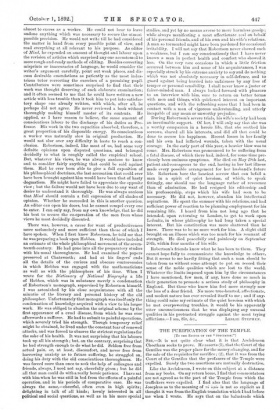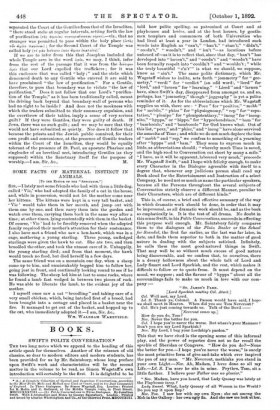THE PURIFICATION OF THE TEMPLE.
[To THE EDITOR OP THE " SPECTATOR."' SIR,—It is not quite clear what it is that Archdeacon Cheetham seeks to prove. He asserts (1), that the Court of the Gentiles was the proper place for the money-changing, and for the sale of the requisites for sacrifice ; (2), that it was from the Court of the Gentiles that the profaners of the Temple were expelled. Surely the two assertions are mutually destructive.
Like the Archdeacon, I wrote on this subject at a distance from my books. On my return home, I find that commentators are not agreed as to the part of the Temple from which the traffickers were expelled. I find also that the language of Josephus as to the meaning of TO hp01, is not so explicit as I thought it was from the English translation which I had before me when I wrote. He says that on the balustrade which separated the Court of the Gentiles from that of the Israelites, "there stood etelm at regular intervals, setting forth the law of purification (rix ecyriioe; a-poirn,iscdPovacsi piiicov),—viz., that no stranger was permitted to pass within the holy place (isrig Tov Ciyiou %-sepaysuu) ; for the Second Court of the Temple was called holy (TO ycip hgep0s (saw, aytom bccatiro). "
If we are to infer from this that Josephus included the whole Temple area in the word lep4, we may, I think, infer from the rest of the passage that it was from the agtn-Epoy ivp6 that our Lord expelled the traffickers ; for it was this enclosure that was called " holy ; " and the stelae which denounced death to any Gentile who entered it are said to have proclaimed " the law of purification." For a Gentile, therefore, to pass that boundary was to violate " the law of purification." Does it not follow that our Lord's "purifica- tion of the Temple," as it has been traditionally called, meant the driving back beyond that boundary-wall of persons who had no right to be inside And does not the meekness with which the traders submitted to their summary expulsion, and the overthrow of their tables, imply a sense of very serious guilt? If they were Gentiles, they were guilty of death. If Jews, there was no such guilt ; and we may be sure that they would not have submitted so quietly. Nor does it follow that because the priests and the Jewish public connived, for their own profit and convenience, at the presence of Gentile traders within the Court of the Israelites, they would be equally tolerant of the presence of St. Paul, an apostate Pharisee and ringleader of an heretical sect, introducing Gentiles (as they supposed) within the Sanctuary itself for the purpose of



































 Previous page
Previous page